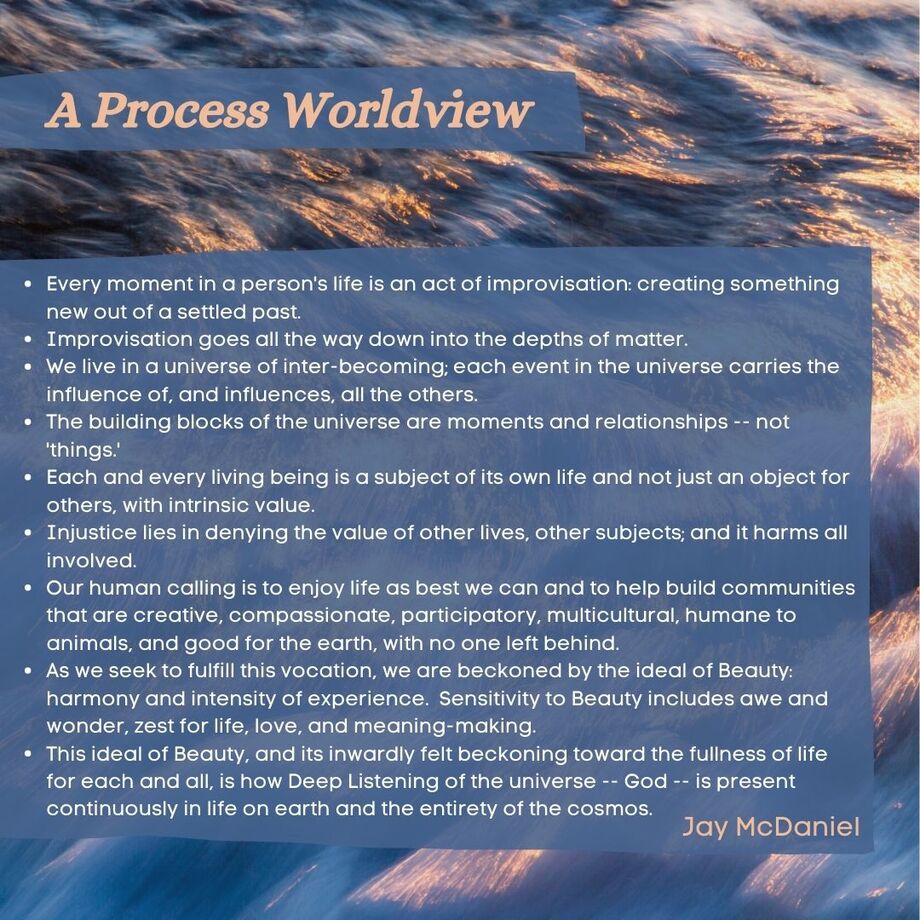R.E. Slater
March 14, 2023


What Is Process?
by Jay McDaniel
July 7, 2021
The Process movement is a network of people around the world who want to make a constructive difference in the world. They include farmers, artists, business persons, government officials, philosophers, sociologists, educators, grandmothers, social workers, musicians, and poets. Some are religious and some are not; but all are hopeful.
Those who are religious include Bahais, Buddhists, Christians, Daoists, Hindus, Jews, Muslims, Pagans, and Unitarian Universalists. These traditions are very important to them, and they weave a process outlook on life onto, and with help from, their spiritual lineages.
Nevertheless some people in the process network are spiritually interested but not religiously affiliated. Indeed, for many, including those who enjoy a sense of religious belonging, the topic of "religion" is not as important to them as are many other topics facing humanity, other animals, local communities, and the Earth today.
So what do they have in common? They share four hopes that animate their actions in local communities and the broader world.
Whole Persons. They work to help individuals around the world grow in personal wholeness and spiritual vitality (e.g. creativity, beauty, love, forgiveness, faith, playfulness, gratitude, listening, and a sense of wonder)Compassionate Communities: They help build compassionate communities that are creative, caring, participatory, diverse, inclusive, good for animals and good for the Earth: with no one left behind.A Flourishing Planet: They work to help the planet as a whole flourish with its many forms of life. Toward this end they encourage "world loyalty" as well as "local loyalty," encouraging people to think of the Earth as a whole as an Earth Community deserving respect and care. This hope lies behind their commitment to "ecological civilizations."Holistic Thinking. They encourage holistic ways of thinking - drawing from science, art, philosophy, and spirituality - that help people live with respect and care for the Earth community, enjoy meaningful bonds in local settings, and find personal happiness.
For process thinkers there are many obstacles to these hopes. Examples include:
(1) the excessive individualism of western modernity and consumer culture,(2) a mechanistic understanding of the world that reduces all things to inert objects in space,(3) the failure of higher education to address serious problems of the world, and(4) the failure of education as a whole to help people become whole persons in whole communities.
Some process thinkers believe that the world is headed toward catastrophe: global climate change, chronic economic inequities, animosities between nations, and political dysfunction, The four hopes are not just icing on a cake. They are necessary for survival.
Many process thinkers take the philosophy of the late mathematician and philosopher, Alfred North Whitehead, as an alternative to hyper-individualism and mechanism and believe that his "philosophy of organism" is the kind of holistic thinking sorely needed.
Below I offer an example of a Whiteheadian version of holistic thinking.
 |
| click to enlarge |
Those of us in the Process movement recognize and celebrate that there are other, non-Whiteheadian forms of holistic thinking that are also conducive to living with respect and care for the community of life on Earth. The Process network can well include Islamic, Jewish, East Asian, African, and Indigenous forms of wisdom that are Whiteheadian, but that are extremely important if the four hopes are to be realized. It is the four hopes that matter the most. They are what animate the Process movement.


















































































